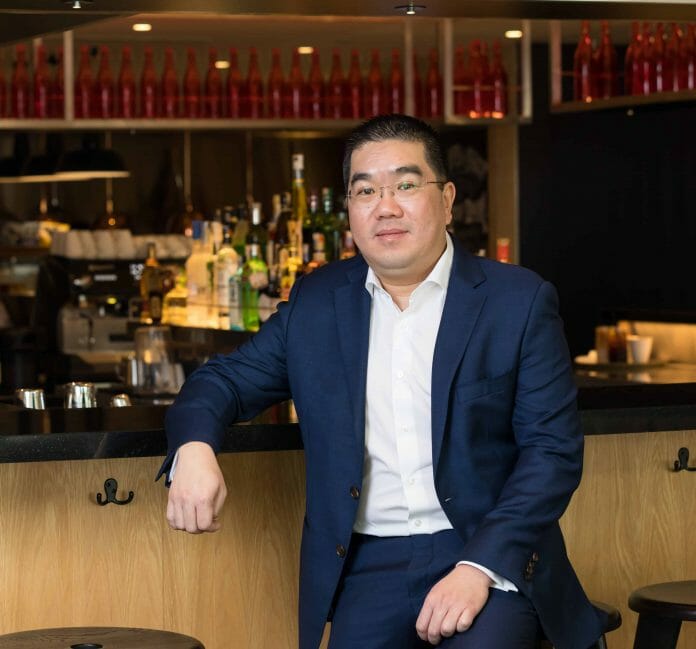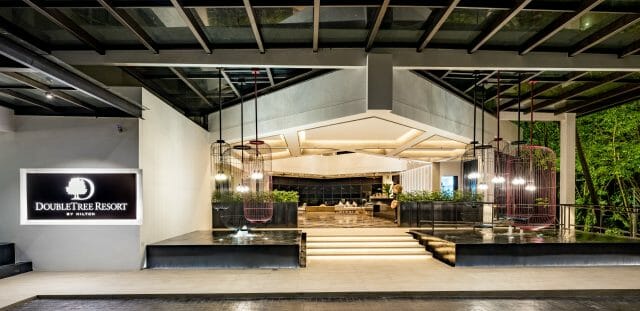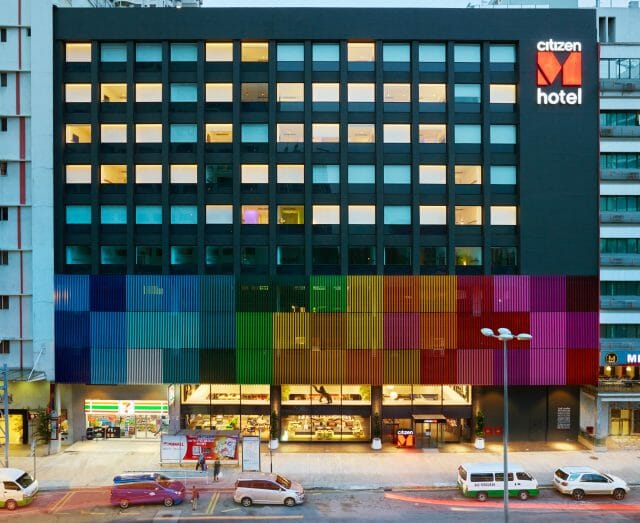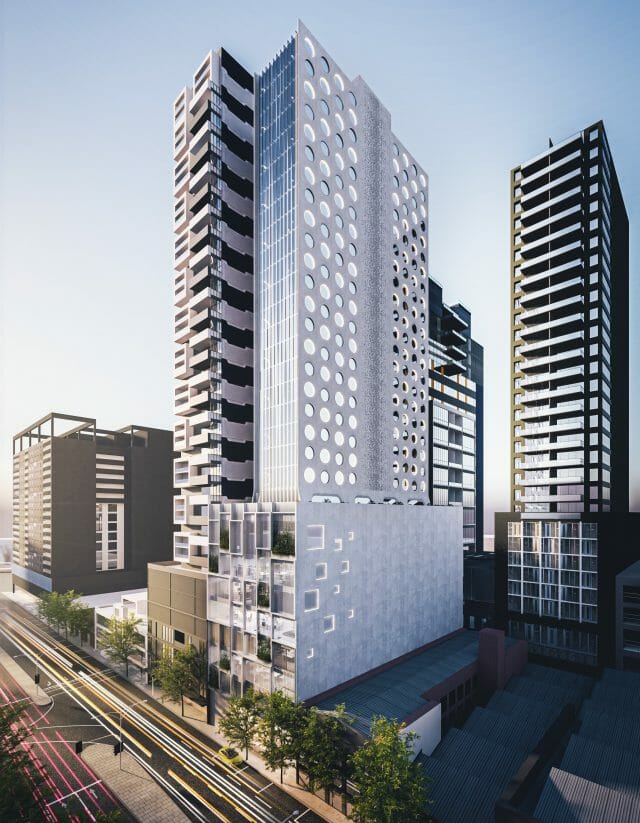Business Today interviews Jason Chong, Co-Founder and CEO of Cornerstone Partners Group (CPG), on how to stay luxuriously lean in the world of hospitality By Sharon Chang
Walking into the brightly-lit and artistic lobby – the ‘living room’ – of citizenM in Bukit Bintang, the first thing one would notice are the thoughtfully curated artworks everywhere, juxtaposed with iconic styling pieces from around the world.
Everything is designed with modern and stylish furnishings, painted art ceilings, foliage carpets, and large planters with hanging greenery. Guests lounged on the ultra comfortable Vitra-designed chairs and couches, some engrossed in their digital gadgets, while others were enjoying a meal or a cup of coffee. In addition, there is no reception, no concierge — just an innovative front-counter — where guests do their own self-check-in. However, there are a few hotel ambassadors standing close by to assist or for a friendly chat if desired!
While we were still appreciating the décor, Chong enters at some velocity looking for his team. The softspoken man, dressed in a well-cut suit for our meet, commands the kind of attention more often seen in larger corporations. Chong is not an easy man to pin down, not because he is aloof, but because he is, firstly, engaged with work, and always on the move.
CPG, established in 2014, may be a relative newbie in the hotel industry, but they have gained a strong foothold in this sector with four hotel assets across three countries in Asia Pacific to date, added to their portfolio. Chong sits down and tell us his plans and direction, and how the company has become one of the emerging players in the hotel industry.
The Journey
In the beginning, when Chong was requested to come home to help-out in the family business, it was a challenging period. Then, it was 1998, on the heels of the Asian Financial Crisis. The entire Development and Construction industry was something of a foreign concept to him, even though his family has been in the construction business for decades. His passion leaned more towards hotels fit-outs’ rather than the brick and mortar process. The first few years was purely a learning curve, attending meetings and looking at contracts, as he didn’t possess an engineering background.
Chong spent almost five years in Australia, completed his education with a degree in Finance and worked in one of the big banks for less than a year. His initial plan was to settle down there, but fate brought him home. It was a drastic change of plans, but ever since then, there was no turning back.
CPG’s first property investment was an old operationally distressed hotel in Penang. Ironically, the owner of the hotel was their client whom his family has been servicing for decades. The initial intention was to turn the hotel into a condominium. But, in that year, many consideration factors played out. Firstly, there were many policy issues to abide and address, and the process would have taken too long with the Penang State Government. Secondly, the Penang property market was on a downturn – luxury condominiums were not selling well.
THE IDEA
“Due to all the obstacles and, after much and careful consideration on the potential of the property, we decided to convert it into a hotel instead. Since, my family’s business focus was mainly in construction and hotels fit-outs, while my partner’s business was in furnishing, why don’t we build our own instead?” Chong reminisces.
Chong being a seasoned traveller, noticed gaps in the hospitality market in certain developing countries. According to him, there were many missing international brands offerings in these key markets.
Thanks to the relationships the family has with the hotel industry, the contacts and mentorships which Chong has established over the years, CPG began its inroad into the hospitality foray. They transformed the old hotel into the DoubleTree Resort by Hilton Penang.
As this was their first project with an upscale international hotel brand, working with them proved to be a great learning experience for Chong. “Partnering with one of the biggest hotel brands in the market, means we have to adhere to their (Hilton’s) standards and requirements. They are one of the strictest and toughest operators to deal with, but the partnership has helped us understand a lot about the hotel business in such a short time,” Chong exclaims.
However, leveraging on the excellent location, the existing structure’s quality and the rapid development of Penang, it became clear that there were more advantages in conversion over new builds.
“Moreover, being managed by Hilton also gave the property an edge, as we can tap into their huge customer base, which will be difficult if we were to build our own brand,” he adds.
WITH PASSION COMES PRESENCE
CPG has since then been on the look-out for buildings with unrealised value for potential upside conversions.
Opportunity came knocking again in 2017, when CPG entered into a partnership with InterContinental Hotels Group (IHG), another of the world’s leading hotel companies, on the signing for a Kimpton Hotel in Taipei, marking IHG’s first Kimpton hotel in Taiwan and Asia.
“In Taiwan, the demand for international hotel brands remains healthy, despite the rapid entry of lodging facilities by operators such as Airbnb. In recent years, a significant amount of foreign capital returned to the Taiwan market, which contributed to the country’s continuous growth,” Chong explains.
“We were very confident of the market outlook and hence it was the perfect opportunity to expand our footprint in the region.”
In the same year, CPG was also, offered to acquire a hotel in one of the liveliest areas in Kuala Lumpur.
“People asked me, why do I want to squeeze myself in a location where the surrounding is not attractive? Why not look for a site where all the five-star and upmarket hotel brands are?” Chong recalls.
After conducting a feasibility study, Chong knew the locality needed a niche product. The location, timing and market opportunity were all in place. But which product was suitable and sustainable?
“The product has to be a well defined, lifestyle centric and design-led hotel which can cater to the modern group of travellers such as the millennials, a hotel offering five-star frills at affordable prices,” says Chong.
“Nowadays, modern travellers value personal choice, contemporary design, user friendly technology and close proximity to a city – all for great value.”
During his travels, Chong stayed in many different hotels but one which made an enduring impression was citizenM in Amsterdam. After staying there for a couple of nights, he knew this product is right for the niche market and would be the best fit for the Bukit Bintang location.
The experience was amazing, Chong exclaims. “When I mentioned that I wanted to bring in a product where the rooms are only 19-20 square metres, they said I was crazy! Chong laughs. To me, citizenM is a product which will persevere over any five-star brands. It is a new wave of hotels that can and likely will dominate the market.”
According to Chong, “Every product has its own niche. The DNA, the clientele and the whole operation need to be well-defined. We do not need a mass-market product. citizenM has been in the market for over 10 years, they are stylish, modern and fresh – unlike some generic hotel brands which are practically indistinguishable from one another.”
citizenM is targeting all key gateway cities in the region, such as Singapore, Hong Kong, Beijing, Bangkok, Jakarta, Seoul, Tokyo and Osaka, as part of its expansion plans. Initially, Malaysia was not in their radar, but after exchanging many notes with CPG, a relationship was signed.
“We told them let’s do it together, place your brand in a location where people will appreciate it — don’t compete in an affluent matured market or an area which is defined and carve your product’s name there.”
Hence, in 2019, citizenM Kuala Lumpur, a 210-key hotel opened its doors to every traveller who seek comfort and a cheeky attitude. The rooms are space-efficient and functional. Everything in the room is remotely controlled from an iPad – the temperature, lighting, TV and music.
KEY PILLARS TO SUSTAINABILITY
Timeless hospitality does not operate on a fixed set of rules which have been proven time and time again. Instead, it is defined by hotels’ ability to remain relevant despite the evolving climate of the industry. So how do you achieve this?
In every investment, Chong concurs, the risk is always present. “There are no guarantees the moment you invest in something, as we are introducing a product or brand into a market which has yet to mature.”
Firstly, we like to have products which are outof-the-box, we look towards what the market needs in five to ten years, and secondly, identify and market the niche. Thirdly, know your crowd and lastly, define the product’s DNA clearly.
Much of guests’ dissatisfaction stems from the guests and the hotel being the wrong fit for each other. In order for hoteliers to guarantee a fitting level of service to their guests, they must first attract the right guests.
The modern guest is always looking for an experience, as such the brand needs to add more value to their services. The long-term success relies on being in tune with the character of the brand.
THE RIGHT HOTEL BRAND
Working with a brand can bring many benefits to both the hotel and hotel owner, but it could also be otherwise. There are many things to consider when deciding a good hotel brand, from increased distribution channel to the contract duration.
“The top-tier brands are not always the most appropriate. A big part of the decision depends on what you, as the owner of the hotel wants and what the market needs,” Chong shares.
Big metropolitan locations can benefit from a big brand unison, but niche alternative brands can also offer high levels of differentiation.
“We believe a good brand needs to have a clear direction, unique value propositions and strong support channels. Without these criteria, even in good times, it will be challenging,” he opines.
EXPANDING ITS FOOTPRINT
CPG has consistently introduced new trends and unique hospitality offerings to the market. They have grown strategically with four hotel property assets to their name.
Diversifying its investment with a new mixed development project in Melbourne, scheduled for completion in 2022, CPG sets another milestone.
Leveraging on their project development credentials, CPG is focused on fulfilling the gaps in hospitality markets — as the affordable luxury segment has been underserved — across Asia Pacific.
“We are excited and thrilled to introduce our company’s story to Australians,” Chong says.
“When CPG tapped into the Australian market, according to Chong, the currency was at all time low, and Melbourne was on correction. They have a global tourism business crowd and the influx of tourists into the country was huge. International hotel brands were charging at premium prices.
“We saw that gap and recognised the opportunity, after a thorough market survey. We believe we can create the demand and the clientele,” he says.
The project, located on Southbank, is a 30-storey tower comprising a hotel and offices, totalling 15,538 square metres, with a gross development value (GDV) of RM420 million. The site was acquired at a price of AUD20 million. It will have the first Yotel, a UK-based hotel group, another pioneer of technology-driven accommodation.
“Partnering with YOTEL will bring something completely new to the hospitality market in Australia. We believe there is an avenue for disruptive brands like YOTEL, Chong expresses excitedly.
“YOTEL’s global development pipeline focuses on key gateway markets, fits perfectly with our strategy. We are honoured to join forces with them on this project. They, being an international brand, adopts dynamic pricing to fully capitalise on market conditions to ensure the average daily room rates are kept competitive,” he added.
The 240-room hotel with occupies 23 floors of YOTEL Melbourne, is conceptualised to take the elements of premium hotels into smaller, smartdesigned spaces with a community environment for coworking, informal meetings, socialising and wellness.
CPG Tower, which is 100 percent owned and developed by CPG, is set to be a one-stop destination for restaurants, creative coworking spaces and bespoke corporate office spaces in Southbank.
PRESENCE KNOWS NO BOUNDARIES
With the acquisition of a 10 percent stake in luxurious co-working space Colony, CPG’s sees potential synergies between Colony and the hospitality industry.
“We want to diversify, one day we might do a corporate exercise. So, we need to get ourselves vertically and horizontally diversified, Chong shares.
“I wish all my hotels to have coworking spaces. To me, it is a form of complementary disruption to hotels because I’m competing against anything outside my room, from lobby to cafes, function rooms and meeting rooms which are available in coworking space. The rates are cheaper, and the surroundings are nicer.”
THINK OUT OF THE BOX
Growing businesses face a range of challenges. As a business grows, different problems and opportunities demand different solutions.
Recognising and overcoming the common pitfalls associated with growth is essential if your business is to continue to grow and thrive. Crucially, businesses need to ensure that the steps taken today don’t themselves create additional problems for the future.
Chong weighs in.
“Although, there are situations which are out of our control like the world’s political stability which affects the macro economic environment, like the Taiwan and China relationship, we felt it. Though we are not big, it has impacted us. This is a challenge.
“But, as a businessman, we must always look forward with a clear definition, and at CPG we live by our concept of being both lean and luxe,” he remarks lightly.
When you are lean, you can weather the storm; when you are luxe, you can stand out among your peers.
Chong believes that success is not about profits and losses, but the journey to see the vision through.
NO WINNING FORMULA
For CPG’s long-term strategy, the focus is and will continue to be simple. “There is no unique formula for strategy. I believe on the conventional anecdote which is timing, opportunity and the right people,” Chong asserts.
It may sound simplified to many, but having the tenacity to stick to the fundamental credo, is something businesses can learn.
“Don’t Strengthen your weaknesses but bolster your strengths”
“The moment any businesses have these three aspects, strengthen it. No matter how big your business is, keep learning,” Chong stresses.
“Every day is a learning process.”
THE SECOND CHAPTER
Over five years has passed. It has been a learning curve. “We are rewriting the next five years, with new direction, new products, new strategies and new locations,” Chong proclaims.
As Chong concludes excitedly, “Hopefully, three months down the road, we can project CPG as a formidable brand into a new arena unseen by Malaysians.”












